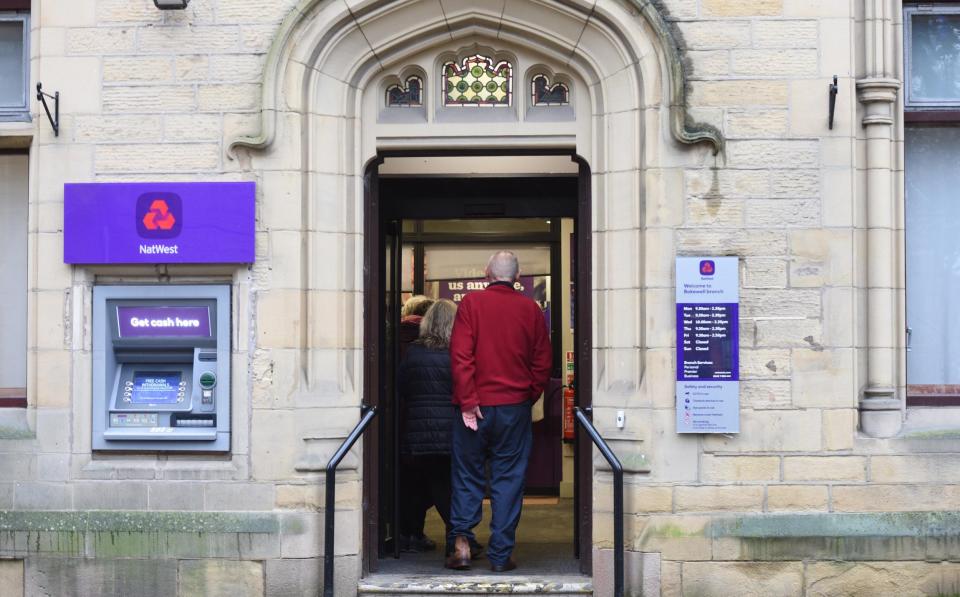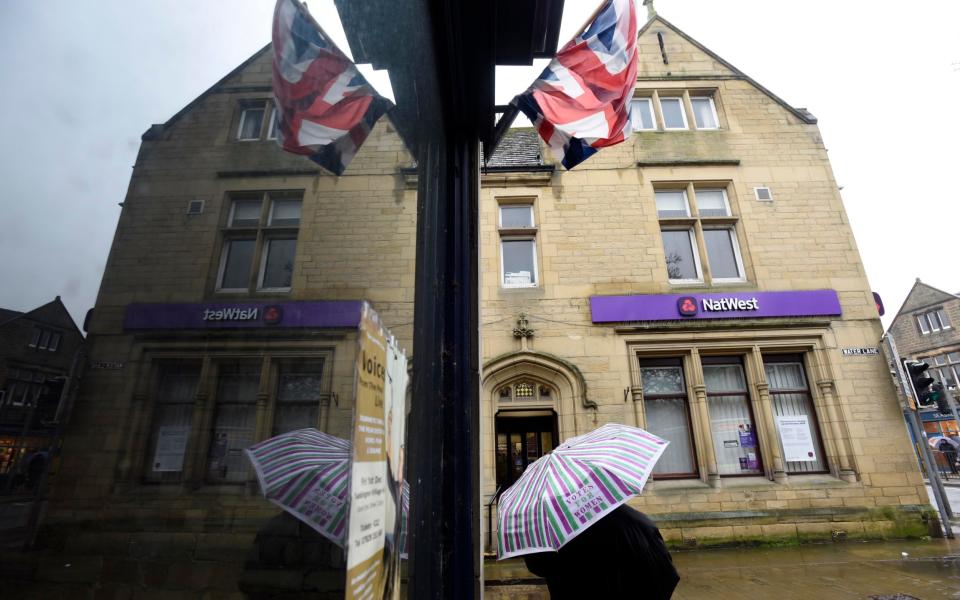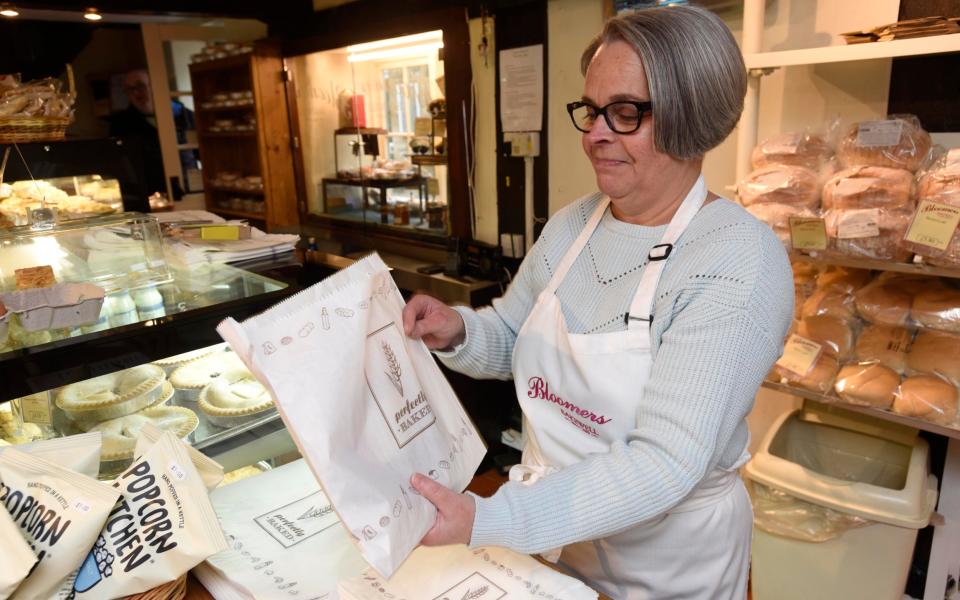‘NatWest is basically telling older customers to b----r off’

The Peak District lost its final bank branch last week. NatWest shut up shop in Bakewell after decades – justifying the decision by claiming that the branch had just six regular customers.
It means that the national park, which covers 555 square miles, no longer has a single bank branch.
But when Telegraph Money visited the market town on Wednesday, the eve of the closure, there was a steady stream of customers and local business owners popping in and out of the bank – despite the miserable weather.
Outraged locals and the town’s MP are now calling into question the figures that banks are using to justify closing branches across the country.

Banks have been closing physical branches at an alarming rate, with 5,835 shutting their doors permanently since January 2015. NatWest has closed more branches than any other group, shutting 1,329 since January 2015, consumer group Which? found.
The closure in Bakewell means that, for locals, the nearest NatWest branch is now half an hour away in Chesterfield.
Customer Alan Elsmore, 86, says: “It’s absolutely dreadful. I’ve finally succumbed and gone to online banking, but I didn’t want to do it. I am scared of it.”
Another customer in her 80s, who also arrived at the branch early to beat the rush, says that she was frightened about the closure. She says she didn’t want to use electronic banking, and that she feels left behind.

When the bank announced the closure late last year, it said that just six personal banking customers were using the service regularly in 2022. Yet it said that 181 business customers had used the branch on a regular basis in the same year.
The day Telegraph Money visited, there were more than 10 customers through the door before 10.27am. The branch opened at 10am.
Locals said that the branch was always busy and there were often queues out of the door.
Sarah Dines, the MP for the town, says that when she asked NatWest what it meant to be a “regular customer”, the bank told her that it meant a person who visited every week in a six-month period. She says: “It’s as clear as mud.”
She adds: “That means if someone goes to Bognor Regis on holiday or has a hip operation, then they are not a regular customer, even if they have visited the branch for 25 weeks out of 26.”
She says that measuring the branch use post-pandemic, a period of time when the elderly and most vulnerable were not back to their normal lives, was skewing the data.
“I would like to think it is ineptitude rather than anything else,” she said.
The Derbyshire Dales has one of the oldest populations in the country, according to ONS data, with more than a third of residents over the age of 60.
Before the closure, Ms Dines had been demanding a four-week extension. The Conservative MP launched a petition, which garnered nearly 4,000 signatures, and presented it at NatWest’s London headquarters.
The Financial Conduct Authority (FCA) was granted new powers to pause closures last year, until adequate cash access has been guaranteed.
When the MP brought up the closure in Parliament, the Prime Minister said that a new cash deposit machine would be installed in the town. But her efforts have failed to reverse the bank’s decision.
Peter Owen, a former academic who lives in the town, says: “You see people going in all the time. I’ve been a customer of this bank for nearly 50 years, in its various forms. But basically the bank is saying that people like me, and the older people in there, are non-profitable customers, so b----r you. It’s as simple as that.”
Mike Pindar, 75, a former interior decorator and architect, says he has been a NatWest customer at the branch for decades.
He says: “The thing is, this bank has been so busy. Busier than most banks, because it is the last one left in the town and it’s the last one left in a big area.
“Everybody is wanting to use that bank. What I was disgusted about is that the person in charge of the bank is peddling this thing about only six people using the bank. The figures are totally plucked from fresh air. They’re meaningless.”
Mr Pindar says: “It’s become so much more difficult to use the bank. I use this bank a lot, because I don’t do online banking.
“The whole strategy is that they are willing to talk about anything to do with encouraging you to do online banking and all sorts of things, and if you can fit in with that, everything’s hunky dory.”
It is not just individuals who will be affected by the closure. Business owners, many of whom still take and rely on cash from their customers, said it will mean banking will take them much longer.
The town is home to the last remaining cattle market in the area, which is run by auctioneer Alastair Sneddon.
Most Mondays, with the occasional extra auction, buyers and sellers will gather in the old-fashioned cattle market to barter for the animals, which sell for anything from £500 to £2,000.
Many of Mr Sneddon’s customers still want to use cheques, he tells Telegraph Money, and after the branch closes, it is going to be much more difficult to deposit them.
He says: “When you sell your pen of lambs or half a dozen bullocks or whatever it is, you have a choice. You can either take away a cheque or you can leave it to us to pop the money into your account.
“There are plenty of farms that are not particularly well-connected to broadband and so forth, so computer banking isn’t everybody’s cup of tea.”

He says that for the meantime, staff members will be able to bank cheques in branches closer to their homes outside the town, but eventually he might have to start travelling further afield.
It is important that the money from sales hits the company’s bank account before the sellers’ cheques start going through, to prevent any cashflow problems. This means that staff need to bank the money quickly after auction day.
The closure might also disrupt an old market tradition.
Mr Sneddon says that when an animal is bought, the seller will often give the buyer what is known as “luck money”. The token gesture, usually between £5 and £10, is intended to introduce the vendors, who will pick up notes from the auction house at the beginning of the day.
“It’s more of a gesture. It gives the vendor the opportunity to be identified. These are mine, I am proud of what I have produced. If you buy them, have a drink with me for having done so,” the auctioneer says.
“These people come into the office and say, ‘I’ve got 10 animals in today, can I have £50 in five pound notes?’ To do that we require just a little bit of float and that will be more difficult to manage.”
Recommended
Is your local bank branch closing? Use our postcode checker to find out
Mark Wakeman, who owns the pet shop in the town and is on its council as a Conservative, says: “One of the problems is the internet. Like at the moment, it’s often down. It’s been down all day.
“They [his customers] have been going to the cash machine and getting cash instead. But they won’t be able to do that.”
Nicola Rose, who works in a bakery down the road from the bank, says older customers are very worried: “It’s the only bank in Bakewell. It’s going to hit the older people really hard.”
Freya Kenworthy, her colleague, says: “They’re worried that cash is going to completely go. They’re always saying, ‘Oh, you young kids don’t use cash,’ but they live by it.”

The Post Office, which comprises two tills in the back of the Spar, is expected to pick up some of the demand for cash services. But it cannot hold as much cash as the bank, and staff at businesses nearby said they’d been experiencing long waits.
More staff have been hired, a manager says, to help keep up. To manage queues when it is busy, only five customers are allowed in at a time in a one-in, one-out system.
Katie Hockley, who works at a gift shop opposite the bank, says that: “It’s going to put more pressure on the Post Office.”
She says the business had chosen to use the Post Office rather than the branch, but that longer queues were making things more difficult.
Ms Hockley adds: “The other day my colleague had to leave the shop to do something, then come back, because she’d been waiting for so long.
“We get change, we get everything from there. It’s really going to affect people. But there’s nothing we can do.”
A banking hub has been approved for the town but is unlikely to be ready for several months.
A NatWest spokesman said that while the bank recognised it was important not to leave anyone behind when branches closed, most of its customers are shifting to mobile and online banking.
He said: “We take our responsibility seriously to support the people who face challenges in moving online, so we are investing to provide them with support and alternatives that work for them.”

 Yahoo Finance
Yahoo Finance 